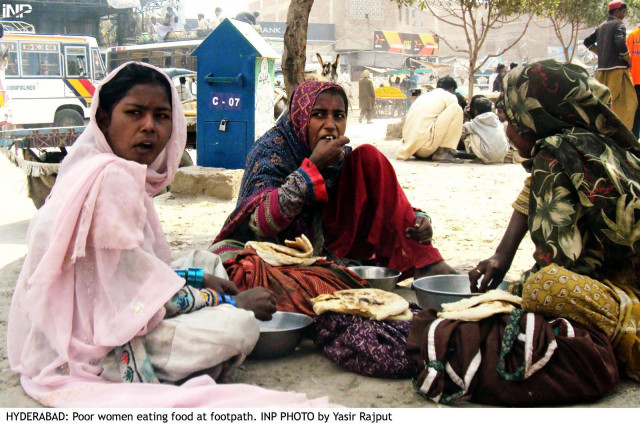Malnutrition survey: ‘Over 70% mothers in Sindh are vitamin D deficient’
Alarming statistics on nutrition discussed at policy dialogue on Wednesday.

Three women eat by the roadside in Hyderabad on Wednesday. Over 70% mothers in Sindh are vitamin D deficient. PHOTO: INP
These alarming statistics on malnutrition levels in the country were revealed in the National Nutrition Survey, which was discussed in a policy dialogue organised by Save the Children on Wednesday. The event aimed to bring together experts to examine the current nutrition levels in Sindh, identify the role of different stakeholders and come up with a way forward to address the issue in the province.
Dr Shabina Ariff, an assistant professor at Women and Child Health Division at Aga Khan University, said that newborns will be affected if mothers were a victim of malnutrition. Women in Sindh had the highest reported rates of night blindness during their last pregnancy, she pointed out. "These figures have not changed significantly in the past decades," she said. "Under such conditions, children - the backbone of the country - will not be able to help it move forward."
There was risk of suffering from a 'demographic nightmare' of a growing unskilled, economically unproductive population if the issue of malnutrition is not addressed, claimed Prof Dr Iqbal Memon, the president of the Pakistan Paediatric Association. "A poorly constructed building will eventually fall."
While highlighting several misconceptions about healthy children, Prof Memon said that mothers usually come with a concern that their children were weak despite the fact that they don't know the definition of a healthy child. "Only the fattest child, one who looks like an ox, is considered a healthy child, which is a misconception," he clarified, adding that feeding babies from a feeder led to many diseases.
Dr Saifullah Jamro, the head of the paediatrics department at Chandka Medical College in Larkana, warned that malnutrition makes children vulnerable to communicable diseases, such as measles. Malnutrition also reduces the effectiveness of certain vaccinations, he added.
Poverty not a major cause
Dr Salma Shaikh, a professor at Liaqat Medical University, explained that poverty was not the only reason behind child malnutrition in the country as there was a strong relationship between fertility, disease burden and practices, such as hand washing and breastfeeding. "Malnutrition undermines both physical and mental development in children," she said.
Other speakers insisted, however, that issues of poor governance, social injustice, gender-based discrimination and poor resource allocations need to be addressed. "If not for God's sake, please be united for humanity's sake," said civil society activist Zulfiqar Halepoto.
Even Save the Children's provincial advocacy manager Iqbal Detho urged that malnutrition should be taken up as a national issue and must receive the attention of policy makers and legislators. Dr Irshad Danish of the same organisation said that current malnutrition crisis in Pakistan has been estimated to cost the economy three per cent of the GDP per year.
Dr Haris Gazdar, a social policy and political economy expert, said that malnutrition was a complex issue which was closely linked with governance and political economy. The complexity of the issue can be unfolded through research and dialogues, he suggested.
Published in The Express Tribune, February 27th, 2014.


















COMMENTS
Comments are moderated and generally will be posted if they are on-topic and not abusive.
For more information, please see our Comments FAQ